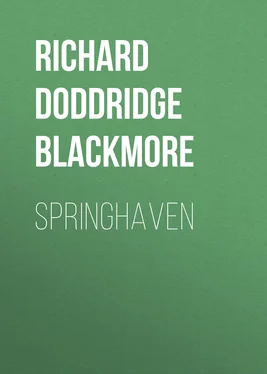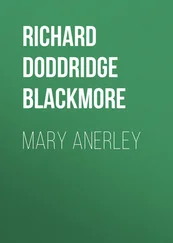Richard Doddridge Blackmore - Springhaven
Здесь есть возможность читать онлайн «Richard Doddridge Blackmore - Springhaven» — ознакомительный отрывок электронной книги совершенно бесплатно, а после прочтения отрывка купить полную версию. В некоторых случаях можно слушать аудио, скачать через торрент в формате fb2 и присутствует краткое содержание. Жанр: foreign_prose, История, foreign_edu, foreign_antique, на английском языке. Описание произведения, (предисловие) а так же отзывы посетителей доступны на портале библиотеки ЛибКат.
- Название:Springhaven
- Автор:
- Жанр:
- Год:неизвестен
- ISBN:нет данных
- Рейтинг книги:3 / 5. Голосов: 1
-
Избранное:Добавить в избранное
- Отзывы:
-
Ваша оценка:
- 60
- 1
- 2
- 3
- 4
- 5
Springhaven: краткое содержание, описание и аннотация
Предлагаем к чтению аннотацию, описание, краткое содержание или предисловие (зависит от того, что написал сам автор книги «Springhaven»). Если вы не нашли необходимую информацию о книге — напишите в комментариях, мы постараемся отыскать её.
Springhaven — читать онлайн ознакомительный отрывок
Ниже представлен текст книги, разбитый по страницам. Система сохранения места последней прочитанной страницы, позволяет с удобством читать онлайн бесплатно книгу «Springhaven», без необходимости каждый раз заново искать на чём Вы остановились. Поставьте закладку, и сможете в любой момент перейти на страницу, на которой закончили чтение.
Интервал:
Закладка:
“Exactly. You could not have put it better. You get no vacancies by shot and shell, and being fit for another world, you keep out of it. Have you ever heard me tell the story about Gunner MacCrab, of the Bellerophon?”
“Fifty times, and more than that,” replied the sturdy parson, who liked to make a little cut at the Church sometimes, but would not allow any other hand to do it. “But now about our young friend here. Surely, with all that we know by this time of the character of that Bony, we can see that this peace is a mere trick of his to bamboozle us while he gets ready. In six months we shall be at war again, hammer and tongs, as sure as my name is Twemlow.”
“So be it!” cried the Admiral, with a stamp on his oak floor, while Scudamore’s gentle eyes flashed and fell; “if it is the will of God, so be it. But if it once begins again, God alone knows where France will be before you and I are in our graves. They have drained all our patience, and our pockets very nearly; but they have scarcely put a tap into our energy and endurance. But what are they? A gang of slaves, rammed into the cannon by a Despot.”
“They seem to like it, and the question is for them. But the struggle will be desperate, mountains of carnage, oceans of blood, universal mourning, lamentation, and woe. And I have had enough trouble with my tithes already.”
“Tithes are dependent on the will of the Almighty,” said the Admiral, who paid more than he altogether liked; “but a war goes by reason and good management. It encourages the best men of the day, and it brings out the difference between right and wrong, which are quite smothered up in peace time. It keeps out a quantity of foreign rubbish and stuff only made to be looked at, and it makes people trust one another, and know what country they belong to, and feel how much they have left to be thankful for. And what is the use of a noble fleet, unless it can get some fighting? Blyth, what say you? You know something about that.”
“No, sir, I have never been at close quarters yet. And I doubt—or at least I am certain that I should not like it. I am afraid that I should want to run down below.”
Mr. Twemlow, having never smelled hostile powder, gazed at him rather loftily, while the young man blushed at his own truth, yet looked up bravely to confirm it.
“Of all I have ever known or met,” said Admiral Darling, quietly, “there are but three—Nelson and two others, and one of those two was half-witted—who could fetch up muzzle to muzzle without a feeling of that sort. The true courage lies in resisting the impulse, more than being free from it. I know that I was in a precious fright the first time I was shot at, even at a decent distance; and I don’t pretend to like it even now. But I am pretty safe now from any further chance, I fear. When we cut our wisdom-teeth, they shelf us. Twemlow, how much wiser you are in the Church! The older a man gets, the higher they promote him.”
“Then let them begin with me,” the Rector answered, smiling; “I am old enough now for almost anything, and the only promotion I get is stiff joints, and teeth that crave peace from an olive. Placitam paci, Mr. Scudamore knows the rest, being fresh from the learned Stonnington. But, Squire, you know that I am content. I love Springhaven, Springhaven loves me, and we chasten one another.”
“A man who knows all the Latin you know, Rector—for I own that you beat me to the spelling-book—should be at least an Archdeacon in the Church, which is equal to the rank of Rear-Admiral. But you never have pushed as you should do; and you let it all off in quotations. Those are very comforting to the mind, but I never knew a man do good with them, unless they come out of the Bible. When Gunner Matthew of the Erigdoupos was waiting to have his leg off, with no prospect before him—except a better world—you know what our Chaplain said to him; and the effect upon his mind was such, that I have got him to this day upon my land.”
“Of course you have—the biggest old poacher in the county. He shoots half your pheasants with his wooden leg by moonlight. What your Chaplain said to him was entirely profane in the turn of a text of Holy-Writ; and it shows how our cloth is spoiled by contact with yours”—for the Admiral was laughing to himself at this old tale, which he would not produce before young Scudamore, but loved to have out with the Rector—“and I hope it will be a good warning to you, Squire, to settle no more old gunners on your property. You must understand, Mr. Scudamore, that the Admiral makes a sort of Naval Hospital, for all his old salts, on his own Estates.”
“I am sure it is wonderfully kind in him,” the young man answered, bravely, “for the poor old fellows are thrown to the dogs by the country, when it has disabled them. I have not seen much of the service, but quite enough to know that, Mr. Twemlow.”
“I have seen a great deal, and I say that it is so. And my good friend knows it as well as I do, and is one of the first to lend a helping hand. In all such cases he does more than I do, whenever they come within his knowledge. But let us return to the matter in hand. Here is a young man, a first-rate sailor, who would have been under my guardianship, I know, but for—but for sad circumstances. Is he to be grinding at Virgil and Ovid till all his spirit goes out of him, because we have patched up a very shabby peace? It can never last long. Every Englishman hates it, although it may seem to save his pocket. Twemlow, I am no politician. You read the papers more than I do. How much longer will this wretched compact hold? You have predicted the course of things before.”
“And so I will again,” replied the Rector. “Atheism, mockery, cynicism, blasphemy, lust, and blood-thirstyness cannot rage and raven within a few leagues of a godly and just nation without stinking in their nostrils. Sir, it is our mission from the Lord to quench Bony, and to conquer the bullies of Europe. We don’t look like doing it now, I confess. But do it we shall, in the end, as sure as the name of our country is England.”
“I have no doubt of it,” said the Admiral, simply; “but there will be a deal of fighting betwixt this and then. Blyth, will you leave me to see what I can do, whenever we get to work again?”
“I should think that I would, sir, and never forget it. I am not fond of fighting; but how I have longed to feel myself afloat again!”
CHAPTER XII
AT THE YEW-TREE
All the common-sense of England, more abundant in those days than now, felt that the war had not been fought out, and the way to the lap of peace could only be won by vigorous use of the arms. Some few there were even then, as now there is a cackling multitude, besotted enough to believe that facts can be undone by blinking them. But our forefathers on the whole were wise, and knew that nothing is trampled more basely than right that will not right itself.
Therefore they set their faces hard, and toughened their hearts like knotted oak, against all that man could do to them. There were no magnificent proclamations, no big vaunts of victory at the buckling on of armour, but the quiet strength of steadfast wills, and the stern resolve to strike when stricken, and try to last the longest. And so their mother-land became the mother of men and freedom.
In November, 1802, the speech from the throne apprised the world that England was preparing. The widest, longest, and deadliest war, since the date of gunpowder, was lowering; and the hearts of all who loved their kin were heavy, but found no help for it.
The sermon which Mr. Twemlow preached in Springhaven church was magnificent. Some parishioners, keeping memory more alert than conscience, declared that they had received it all nine, or it might be ten, years since, when the fighting first was called for. If so, that proved it none the worse, but themselves, for again requiring it. Their Rector told them that they thought too much of their own flesh-pots and fish-kettles, and their country might go to the bottom of the sea, if it left them their own fishing-grounds. And he said that they would wake up some day and find themselves turned into Frenchmen, for all things were possible with the Lord; and then they might smite their breasts, but must confess that they had deserved it. Neither would years of prayer and fasting fetch them back into decent Englishmen; the abomination of desolation would be set up over their doorways, and the scarlet woman of Babylon would revel in their sanctuaries.
Читать дальшеИнтервал:
Закладка:
Похожие книги на «Springhaven»
Представляем Вашему вниманию похожие книги на «Springhaven» списком для выбора. Мы отобрали схожую по названию и смыслу литературу в надежде предоставить читателям больше вариантов отыскать новые, интересные, ещё непрочитанные произведения.
Обсуждение, отзывы о книге «Springhaven» и просто собственные мнения читателей. Оставьте ваши комментарии, напишите, что Вы думаете о произведении, его смысле или главных героях. Укажите что конкретно понравилось, а что нет, и почему Вы так считаете.












